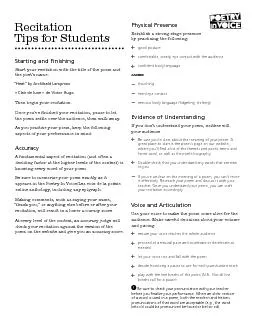PPT-15-213 Recitation 8 Processes, Signals,
Author : tatyana-admore | Published Date : 2018-11-18
Tshlab 22 October 2018 Outline Cachelab Style Process Lifecycle Signal Handling Cachelab Style Grading Style grades will be available soon Click on your score to
Presentation Embed Code
Download Presentation
Download Presentation The PPT/PDF document "15-213 Recitation 8 Processes, Signals," is the property of its rightful owner. Permission is granted to download and print the materials on this website for personal, non-commercial use only, and to display it on your personal computer provided you do not modify the materials and that you retain all copyright notices contained in the materials. By downloading content from our website, you accept the terms of this agreement.
15-213 Recitation 8 Processes, Signals,: Transcript
Download Rules Of Document
"15-213 Recitation 8 Processes, Signals,"The content belongs to its owner. You may download and print it for personal use, without modification, and keep all copyright notices. By downloading, you agree to these terms.
Related Documents














